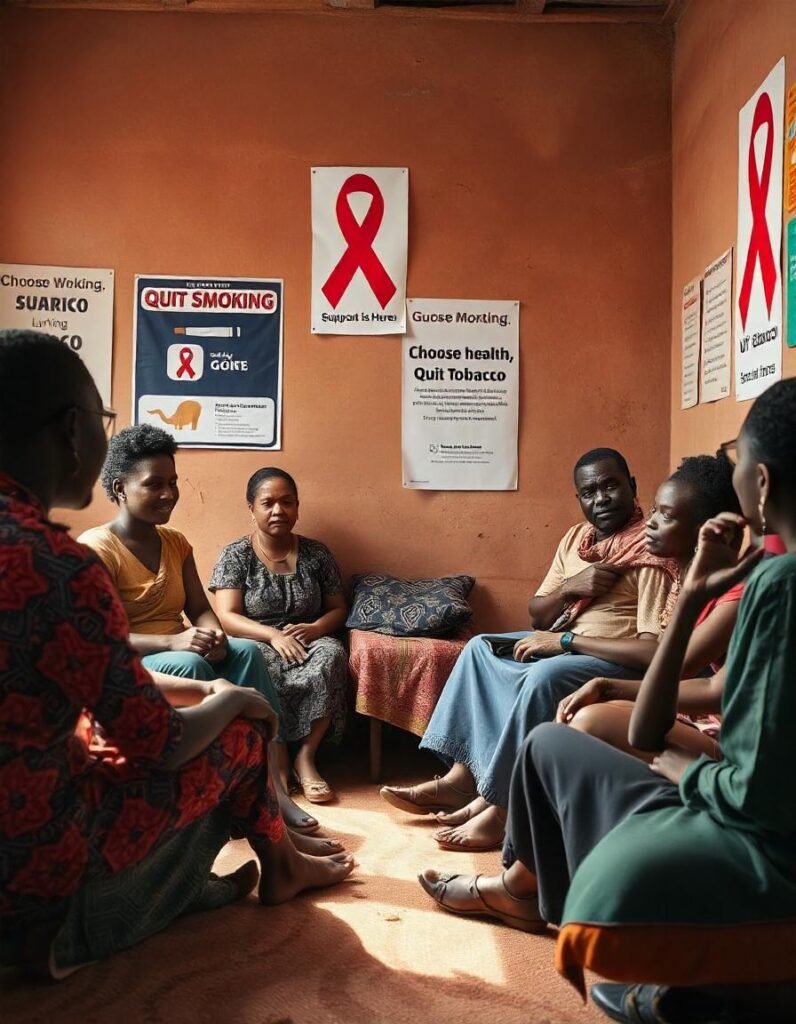This year, the theme for World AIDS Day, “Take the Rights Path,” calls for renewed focus on the rights of people living with HIV/AIDS to access the care and support they need to lead healthier lives. While much progress has been made globally in the fight against HIV/AIDS, there is an urgent need to address one of the often-overlooked challenges faced by people living with HIV/AIDS: Tobacco addiction.
Tobacco and HIV/AIDS: A Dangerous Link
Research shows that people living with HIV/AIDS are more likely to smoke than the general population. Globally, studies suggest that smoking prevalence among people with HIV/AIDS can range from 40% to as high as 70%, compared to around 20% in the general population. Smoking exacerbates the health risks associated with HIV/AIDS, such as cardiovascular disease, respiratory infections, and certain cancers. These risks are compounded in resource-limited settings, where access to healthcare is already a challenge.
In Botswana, a country recognized for its leadership in HIV/AIDS treatment and prevention, the smoking prevalence stands at about 17.6% among adults, according to the World Health Organization (WHO). However, anecdotal evidence and local studies suggest that smoking rates among people living with HIV/AIDS may be disproportionately high, reflecting global trends. Tobacco use among this population not only undermines their health but also places an additional burden on the healthcare system.
Why Tobacco Cessation Matters for People Living with HIV/AIDS
For people living with HIV/AIDS, quitting smoking can significantly improve their quality of life. Tobacco cessation enhances the effectiveness of antiretroviral therapy (ART), reduces the risk of opportunistic infections, and lowers the chances of developing chronic diseases. Despite these benefits, many people living with HIV/AIDS lack access to targeted tobacco cessation programs.
The fight against tobacco addiction must go hand in hand with HIV/AIDS care. Addressing tobacco use aligns with the principles of human rights and health equity, ensuring that people living with HIV/AIDS receive holistic support for all aspects of their health.
Botswana’s Commitment to Tobacco Control and HIV/AIDS
Botswana has been a global leader in combating HIV/AIDS, achieving remarkable progress in reducing new infections and expanding access to ART. However, the country must now broaden its focus to include the impact of tobacco use on this vulnerable population. The Tobacco Control Act of 2021 provides a strong legislative framework to reduce smoking rates, but more targeted interventions are needed.
Organizations like the Anti Tobacco Network (ATN) are stepping up to address this gap by raising awareness about the intersection of tobacco use and HIV/AIDS. Through group counseling sessions, educational campaigns, and advocacy, ATN is working to ensure that people living with HIV/AIDS have the resources and support they need to quit smoking.
Call to Action: Taking the Rights Path
This World AIDS Day, we urge policymakers, healthcare providers, and community leaders to prioritize tobacco cessation as part of comprehensive HIV/AIDS care. Let us:
- Integrate Tobacco Cessation into HIV/AIDS Programs: Healthcare providers should screen for tobacco use during routine HIV care visits and offer cessation support.
- Raise Awareness: Public campaigns should highlight the dangers of smoking for people living with HIV/AIDS and promote available resources for quitting.
- Support Community-Based Programs: Empower local organizations to provide counseling and cessation services tailored to the needs of people living with HIV/AIDS.
By taking these steps, we can ensure that people living with HIV/AIDS in Botswana and beyond have the tools and support they need to quit smoking and live healthier lives. Together, let us take the rights path toward a future free from both the burdens of HIV/AIDS and tobacco addiction.
This message is proudly supported by the National AIDS & Health Promotion Agency and Humana People to People Botswana




